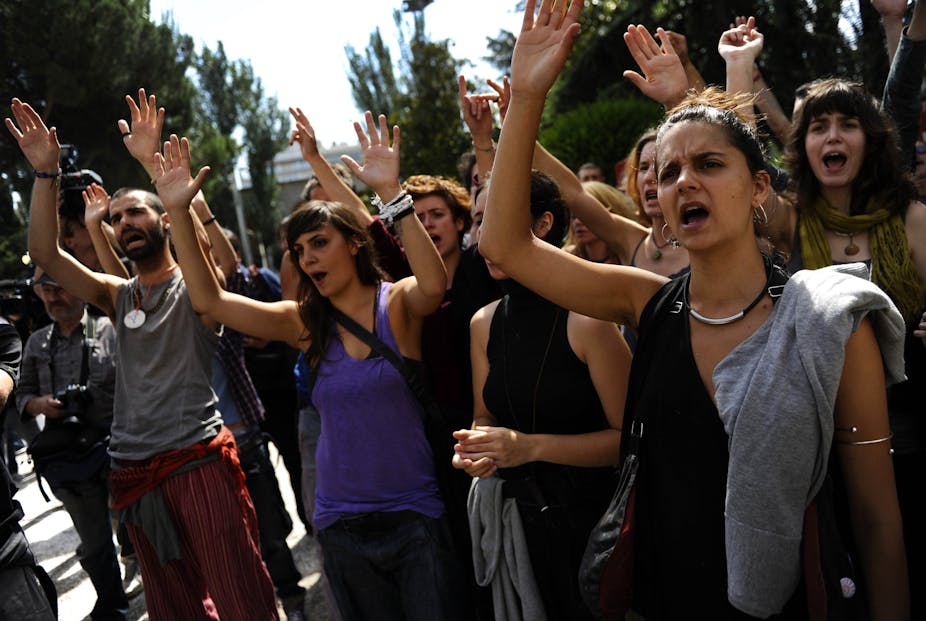As international markets react to the unrest in Greece amid fears of contagion, mass protests have also continued in fellow European Union member country, Spain.
This protest movement, called the “indignant”, began on May 15 in response to austerity measures which has seen Spanish general unemployment hit 21.3%, and youth unemployment sit at just below 43%.
There are fears that Spain might be the next EU country to succumb to massive sovereign debt and as the fifth largest economy in the EU, this might endanger the euro, undermine relations between Spain and the EU, and derail the political project of a united Europe.
Trying to predict whether Spain will suffer a similar fate to that of Greece, Ireland and Portugal is difficult, to say the least, and the same goes for predictions regarding the impact of that eventuality on the eurozone.
Having said that, Spain is in a stronger position to withstand the pressure from the financial markets.
The size of its economy and the far-reaching austerity measures introduced by the ruling Socialist party in May 2010 have been instrumental in neutralising the speculative attacks on Spanish public debt.
This is not to say that Spain is out of the woods yet, and if the country ends up needing substantial financial assistance the economic resilience of the eurozone will be tested like never before.
But one thing is clear: the Spanish economic crisis will not derail the political project of a united Europe.
For all the protests and indignation expressed by the Spanish citizens, their anger is directed against the political leaders and the financial institutions, not against the EU.
The political impact of the crisis will be felt exclusively in Spain.
The socialists are already paying that price. The party suffered a humiliating defeat in the recent local and regional elections, losing power in most cities and in almost all of the 17 autonomous regions.
Their overall support fell to 28%, down from 35% in 2007.
And, despite the fact that the conservative Popular party made only a marginal gain, from 36% to 37.5%, everything points to their triumph in the general elections expected to take place in early 2012.
There is some irony at work here given that the construction boom at the heart of the Spanish crisis was fuelled by the neoliberal reforms of the Popular party, in particular their deregulation of the land market in 1998.
The measure was supposed to increase the number of houses on offer, leading to lower prices and thus making housing affordable. The dream of owning a house spread rapidly and the demand for houses rose to unprecedented levels, pushing prices up –the price per square metre almost tripled between 1998 and 2007.
This drove people into large mortgages, which banks and cajas (saving banks) were only too happy to provide, assuming that house prices would never come down.
The same assumption fuelled the easy access to credit for the purchase of cars, holidays, and often a second house.
When the housing crisis hit in the US, the problem with this economic model became clear, and the credit crunch did not spare Spain.
Unemployment which had dropped from a high of 22.9% in 1995 down to 8.1% in 2007 - thanks largely to the country’s construction boom - has boomeranged rapidly, particularly for Spaniards under 25.
This young, educated and unemployed population is the driving force behind the current street protests in Spain.
Their trademark feeling is indignation – hence their self created tag of “indignados” (the indignant, or discontents).
Their frustration with the lack of opportunities has been compounded by widespread political corruption at the local level and by the sense that most politicians are out of touch with the people.
Their indignation is shared by the majority of the population – although support for the street protests is starting to wane, partly due to the increasing diversity of groups, some with rather idiosyncratic agendas.
In any case, the same voters who punished the socialists in the local elections will probably vote in the conservatives in 2012.
Thus, the party which did the most to embrace the neoliberal policies that led to the current crisis will be put in charge of getting the country out of the crisis.
Given that, if anything, the Popular party will be even more drastic in the application of austerity measures, the current political tension, far from withering, will probably continue for months if not years to come.
There is another irony at work here: both the neoliberal policies that led to the crisis and the austerity measures proposed to get out of the crisis have been encouraged, when not compelled by the European Commission.
Yet, despite all this, there is no indication that the indignation caused by the economic crisis amongst the Spanish citizens will have any impact on the political project of a united Europe.

